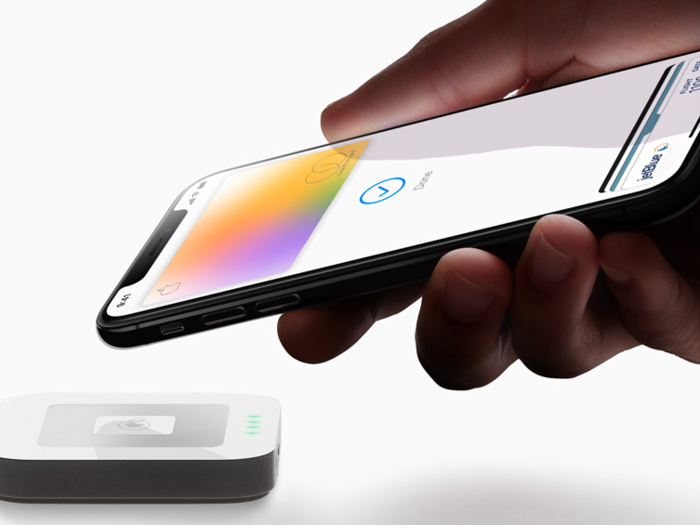
Companies like Apple, Samsung, and Google have made it possible to pay for goods and services with your phone for years. All three companies launched their own respective mobile wallets around the 2014-2015 timeframe: Apple Pay, Samsung Pay, and Google Pay, the latter of which was initially branded as Android Pay.
But if you're anything like me, Apple Pay has mostly served as a backup to my normal credit card when shopping in brick-and-mortar stores or dining out. I would usually pull out my credit card and only resort to my phone if I was in a rush and didn't want to dig out my wallet if it was buried in my backpack or purse.
There are a few reasons for this. For one, it's not always clear which retailers accept Apple Pay and which ones don't, although Apple says that 65% of all retail locations across the US support it. And the last thing anyone wants when they're shopping is to hold up the line because their method of payment isn't working.
But more broadly, changing user behavior is hard. If I'm used to reaching for my wallet, it's going to take a strong incentive to get me to change my ways.
The Apple Card, however, provides that motivation. That's because you get 2% cash back on any purchase made through Apple Pay, and only 1% if you use the optional physical titanium card. The sleek look and feel of Apple's tangible card certainly makes you want to use it. But as time went on, I found myself reaching for it less and less.
There are also some security benefits that come from using Apple Pay more often. Apple doesn't share your actual credit card number with retailers when you use Apple Pay — rather, it shares a device number it's generated that's specific to your iPhone. That means you're sharing your credit card number far less often, which in theory should make it more difficult for thieves to steal it.

Before the Apple Card, I would usually only check my credit card balance occasionally as it got closer to a payment deadline. I would only go through my monthly transactions line-by-line if my balance seemed higher than usual. These habits may not be the best practices for keeping a close eye on your budget, but it was more than enough to make sure all of my bills were paid in full on time.
Nearly every major credit card and bank has a mobile app these days, making it easy to manage your finances on the go. But since the Apple Card is mostly meant to be used digitally, I find myself scrolling through my latest transactions in the Wallet app almost as frequently as I would browse Instagram or Facebook. It's just become a part of my routine, whereas with other cards, I don't really browse through my statements unless I'm paying a balance.
The downside, however, is that this only really holds true for expenses charged to my Apple Card. I take care of my other bills through my bank's website and app, which allows me to handle all of my credit cards and bills through one portal. Because you need Apple's Wallet app to manage the Apple Card, those expenses often feel isolated from the rest.

I knew that signing up for an Apple Card would further bind me to the iPhone. But that didn't become real to me until I switched to Android and suddenly had to adjust how I go about daily routines, like ordering dinner, grabbing a coffee, or taking an Uber.
After more than two months with the Apple Card, I've found that I'm reaching for my phone more often to make daily purchases, and that the Wallet app has made it easier to keep track of my finances. Taken together, those perks have made me more attached to my iPhone than ever before.
But it also means that Apple's grip on me as a consumer has grown even tighter, at a time when the influence and reach of tech behemoths like Apple, Google, Facebook, and Amazon is under more scrutiny than ever before.
It's already getting increasingly difficult to use products and services that aren't operated by one of these companies. Registering for a credit card that's owned by one of them hasn't made that any easier.
 A couple accidentally shipped their cat in an Amazon return package. It arrived safely 6 days later, hundreds of miles away.
A couple accidentally shipped their cat in an Amazon return package. It arrived safely 6 days later, hundreds of miles away. A centenarian who starts her day with gentle exercise and loves walks shares 5 longevity tips, including staying single
A centenarian who starts her day with gentle exercise and loves walks shares 5 longevity tips, including staying single  2 states where home prices are falling because there are too many houses and not enough buyers
2 states where home prices are falling because there are too many houses and not enough buyers 6 Coffee recipes you should try this summer
6 Coffee recipes you should try this summer
 "To sit and talk in the box...!" Kohli's message to critics as RCB wrecks GT in IPL Match 45
"To sit and talk in the box...!" Kohli's message to critics as RCB wrecks GT in IPL Match 45
 7 Nutritious and flavourful tiffin ideas to pack for school
7 Nutritious and flavourful tiffin ideas to pack for school

Copyright © 2024. Times Internet Limited. All rights reserved.For reprint rights. Times Syndication Service.